Negligence and Occupiers' Liability: A Law of Obligations Case Study
VerifiedAdded on 2023/04/22
|5
|1402
|345
Case Study
AI Summary
This case study analyzes John's potential liability for negligence and under the Occupiers' Liability Act. The scenario involves Marco, a guest at John's party, who trips on a wet towel left on the stairs, sustaining injuries. The assignment examines whether John breached his duty of care as an occupier, considering the elements of negligence: duty of care, breach of duty, causation, and remoteness of damages. The analysis references key legal precedents like Donoghue v Stevenson, Vaughan v Menlove, and The Wagon Mound No 1. The assignment also explores the defense of contributory negligence. The conclusion finds John liable for negligence and under the Occupiers Liability Act, with a discussion of why his argument that Marco shouldn't have gone into the room is unlikely to succeed.
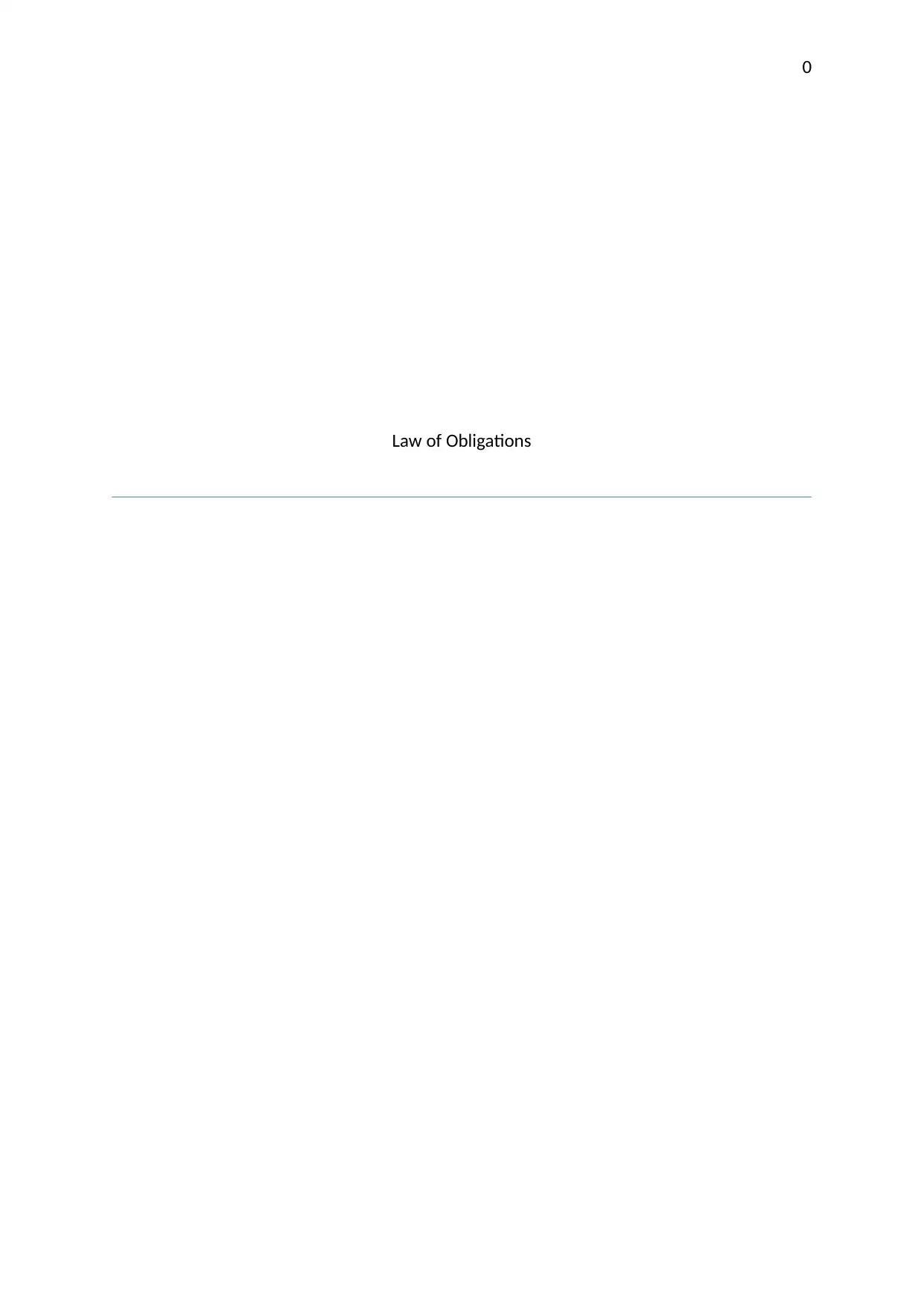
0
Law of Obligations
Law of Obligations
Paraphrase This Document
Need a fresh take? Get an instant paraphrase of this document with our AI Paraphraser
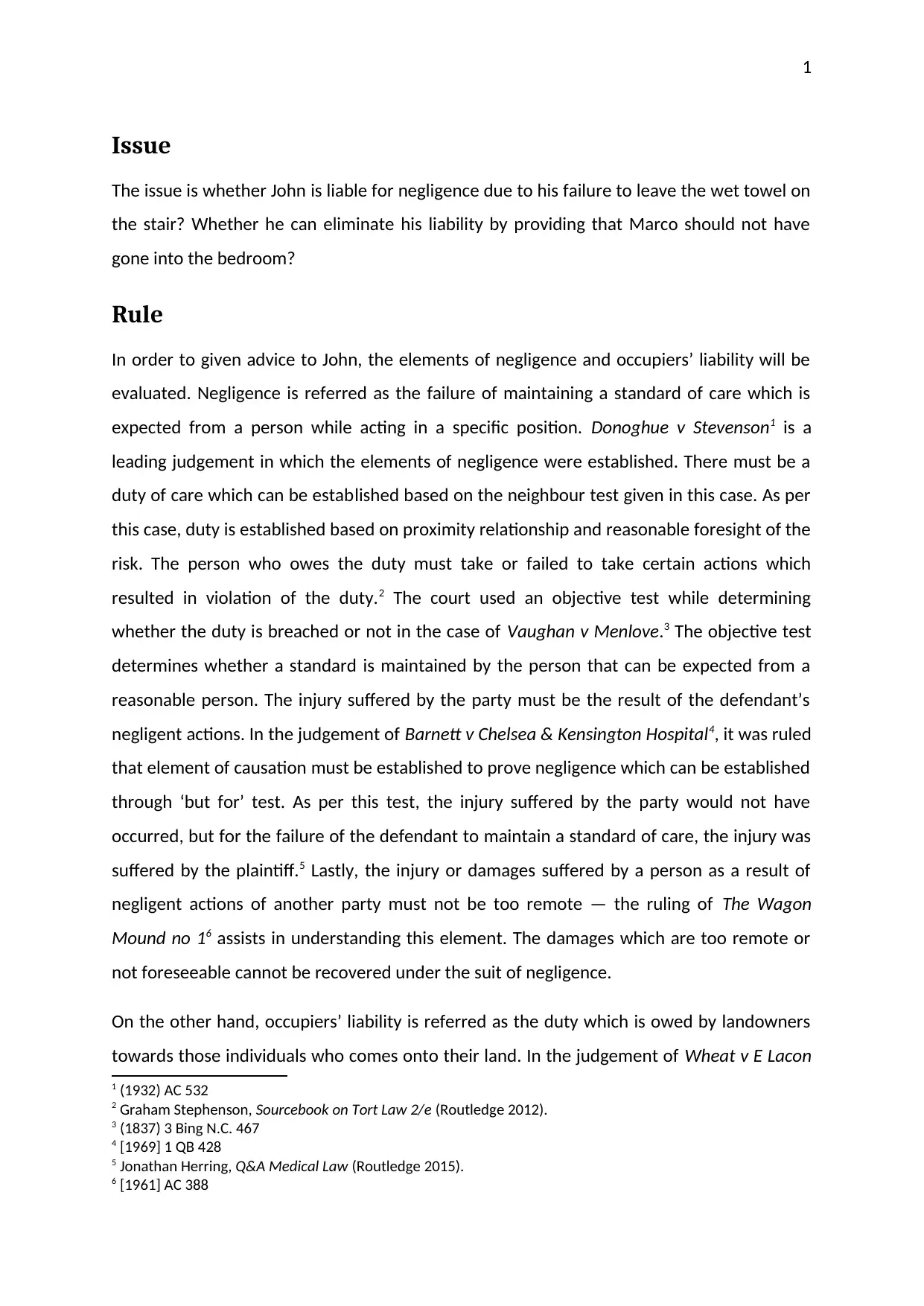
1
Issue
The issue is whether John is liable for negligence due to his failure to leave the wet towel on
the stair? Whether he can eliminate his liability by providing that Marco should not have
gone into the bedroom?
Rule
In order to given advice to John, the elements of negligence and occupiers’ liability will be
evaluated. Negligence is referred as the failure of maintaining a standard of care which is
expected from a person while acting in a specific position. Donoghue v Stevenson1 is a
leading judgement in which the elements of negligence were established. There must be a
duty of care which can be established based on the neighbour test given in this case. As per
this case, duty is established based on proximity relationship and reasonable foresight of the
risk. The person who owes the duty must take or failed to take certain actions which
resulted in violation of the duty.2 The court used an objective test while determining
whether the duty is breached or not in the case of Vaughan v Menlove.3 The objective test
determines whether a standard is maintained by the person that can be expected from a
reasonable person. The injury suffered by the party must be the result of the defendant’s
negligent actions. In the judgement of Barnett v Chelsea & Kensington Hospital4, it was ruled
that element of causation must be established to prove negligence which can be established
through ‘but for’ test. As per this test, the injury suffered by the party would not have
occurred, but for the failure of the defendant to maintain a standard of care, the injury was
suffered by the plaintiff.5 Lastly, the injury or damages suffered by a person as a result of
negligent actions of another party must not be too remote — the ruling of The Wagon
Mound no 16 assists in understanding this element. The damages which are too remote or
not foreseeable cannot be recovered under the suit of negligence.
On the other hand, occupiers’ liability is referred as the duty which is owed by landowners
towards those individuals who comes onto their land. In the judgement of Wheat v E Lacon
1 (1932) AC 532
2 Graham Stephenson, Sourcebook on Tort Law 2/e (Routledge 2012).
3 (1837) 3 Bing N.C. 467
4 [1969] 1 QB 428
5 Jonathan Herring, Q&A Medical Law (Routledge 2015).
6 [1961] AC 388
Issue
The issue is whether John is liable for negligence due to his failure to leave the wet towel on
the stair? Whether he can eliminate his liability by providing that Marco should not have
gone into the bedroom?
Rule
In order to given advice to John, the elements of negligence and occupiers’ liability will be
evaluated. Negligence is referred as the failure of maintaining a standard of care which is
expected from a person while acting in a specific position. Donoghue v Stevenson1 is a
leading judgement in which the elements of negligence were established. There must be a
duty of care which can be established based on the neighbour test given in this case. As per
this case, duty is established based on proximity relationship and reasonable foresight of the
risk. The person who owes the duty must take or failed to take certain actions which
resulted in violation of the duty.2 The court used an objective test while determining
whether the duty is breached or not in the case of Vaughan v Menlove.3 The objective test
determines whether a standard is maintained by the person that can be expected from a
reasonable person. The injury suffered by the party must be the result of the defendant’s
negligent actions. In the judgement of Barnett v Chelsea & Kensington Hospital4, it was ruled
that element of causation must be established to prove negligence which can be established
through ‘but for’ test. As per this test, the injury suffered by the party would not have
occurred, but for the failure of the defendant to maintain a standard of care, the injury was
suffered by the plaintiff.5 Lastly, the injury or damages suffered by a person as a result of
negligent actions of another party must not be too remote — the ruling of The Wagon
Mound no 16 assists in understanding this element. The damages which are too remote or
not foreseeable cannot be recovered under the suit of negligence.
On the other hand, occupiers’ liability is referred as the duty which is owed by landowners
towards those individuals who comes onto their land. In the judgement of Wheat v E Lacon
1 (1932) AC 532
2 Graham Stephenson, Sourcebook on Tort Law 2/e (Routledge 2012).
3 (1837) 3 Bing N.C. 467
4 [1969] 1 QB 428
5 Jonathan Herring, Q&A Medical Law (Routledge 2015).
6 [1961] AC 388
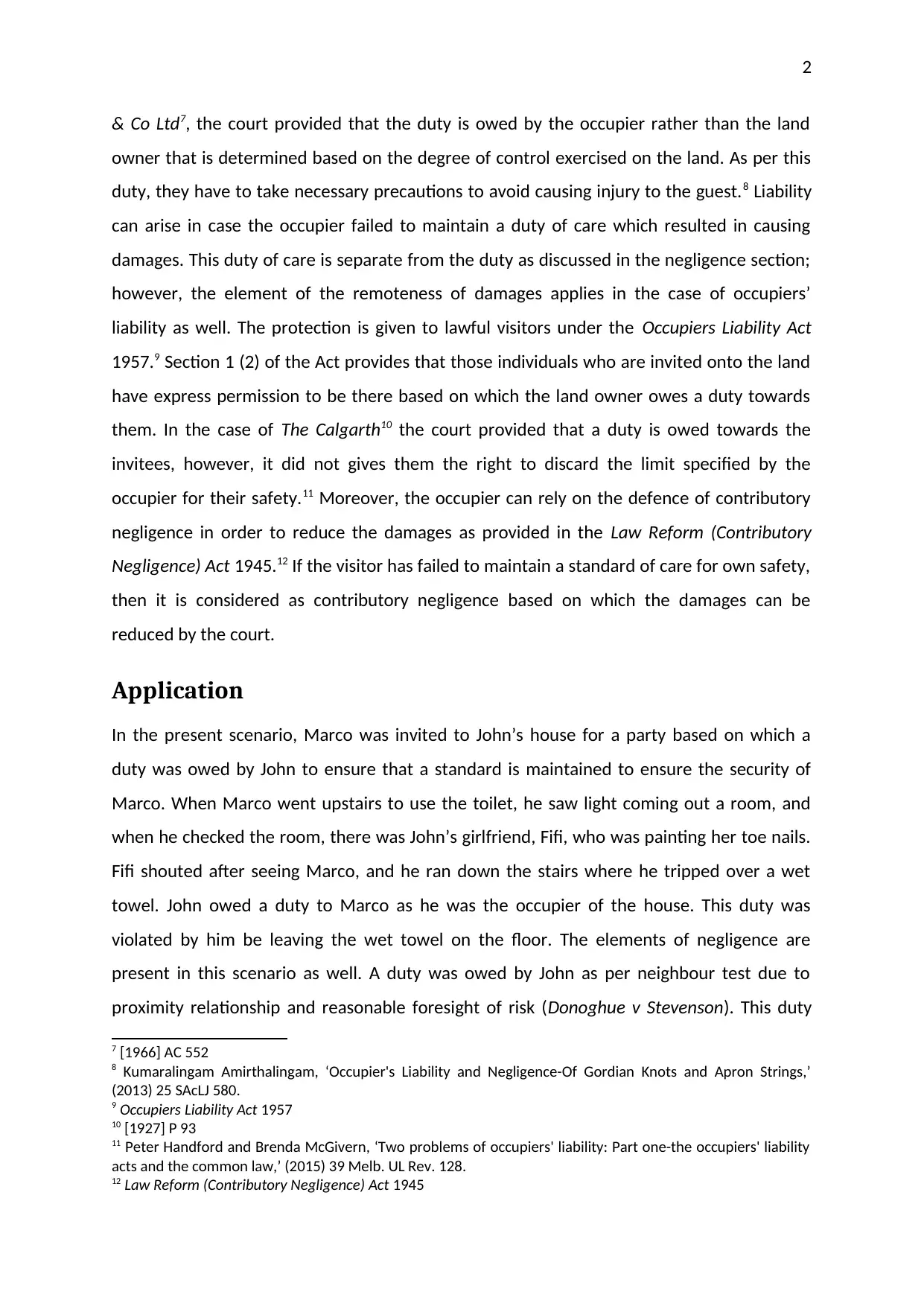
2
& Co Ltd7, the court provided that the duty is owed by the occupier rather than the land
owner that is determined based on the degree of control exercised on the land. As per this
duty, they have to take necessary precautions to avoid causing injury to the guest.8 Liability
can arise in case the occupier failed to maintain a duty of care which resulted in causing
damages. This duty of care is separate from the duty as discussed in the negligence section;
however, the element of the remoteness of damages applies in the case of occupiers’
liability as well. The protection is given to lawful visitors under the Occupiers Liability Act
1957.9 Section 1 (2) of the Act provides that those individuals who are invited onto the land
have express permission to be there based on which the land owner owes a duty towards
them. In the case of The Calgarth10 the court provided that a duty is owed towards the
invitees, however, it did not gives them the right to discard the limit specified by the
occupier for their safety.11 Moreover, the occupier can rely on the defence of contributory
negligence in order to reduce the damages as provided in the Law Reform (Contributory
Negligence) Act 1945.12 If the visitor has failed to maintain a standard of care for own safety,
then it is considered as contributory negligence based on which the damages can be
reduced by the court.
Application
In the present scenario, Marco was invited to John’s house for a party based on which a
duty was owed by John to ensure that a standard is maintained to ensure the security of
Marco. When Marco went upstairs to use the toilet, he saw light coming out a room, and
when he checked the room, there was John’s girlfriend, Fifi, who was painting her toe nails.
Fifi shouted after seeing Marco, and he ran down the stairs where he tripped over a wet
towel. John owed a duty to Marco as he was the occupier of the house. This duty was
violated by him be leaving the wet towel on the floor. The elements of negligence are
present in this scenario as well. A duty was owed by John as per neighbour test due to
proximity relationship and reasonable foresight of risk (Donoghue v Stevenson). This duty
7 [1966] AC 552
8 Kumaralingam Amirthalingam, ‘Occupier's Liability and Negligence-Of Gordian Knots and Apron Strings,’
(2013) 25 SAcLJ 580.
9 Occupiers Liability Act 1957
10 [1927] P 93
11 Peter Handford and Brenda McGivern, ‘Two problems of occupiers' liability: Part one-the occupiers' liability
acts and the common law,’ (2015) 39 Melb. UL Rev. 128.
12 Law Reform (Contributory Negligence) Act 1945
& Co Ltd7, the court provided that the duty is owed by the occupier rather than the land
owner that is determined based on the degree of control exercised on the land. As per this
duty, they have to take necessary precautions to avoid causing injury to the guest.8 Liability
can arise in case the occupier failed to maintain a duty of care which resulted in causing
damages. This duty of care is separate from the duty as discussed in the negligence section;
however, the element of the remoteness of damages applies in the case of occupiers’
liability as well. The protection is given to lawful visitors under the Occupiers Liability Act
1957.9 Section 1 (2) of the Act provides that those individuals who are invited onto the land
have express permission to be there based on which the land owner owes a duty towards
them. In the case of The Calgarth10 the court provided that a duty is owed towards the
invitees, however, it did not gives them the right to discard the limit specified by the
occupier for their safety.11 Moreover, the occupier can rely on the defence of contributory
negligence in order to reduce the damages as provided in the Law Reform (Contributory
Negligence) Act 1945.12 If the visitor has failed to maintain a standard of care for own safety,
then it is considered as contributory negligence based on which the damages can be
reduced by the court.
Application
In the present scenario, Marco was invited to John’s house for a party based on which a
duty was owed by John to ensure that a standard is maintained to ensure the security of
Marco. When Marco went upstairs to use the toilet, he saw light coming out a room, and
when he checked the room, there was John’s girlfriend, Fifi, who was painting her toe nails.
Fifi shouted after seeing Marco, and he ran down the stairs where he tripped over a wet
towel. John owed a duty to Marco as he was the occupier of the house. This duty was
violated by him be leaving the wet towel on the floor. The elements of negligence are
present in this scenario as well. A duty was owed by John as per neighbour test due to
proximity relationship and reasonable foresight of risk (Donoghue v Stevenson). This duty
7 [1966] AC 552
8 Kumaralingam Amirthalingam, ‘Occupier's Liability and Negligence-Of Gordian Knots and Apron Strings,’
(2013) 25 SAcLJ 580.
9 Occupiers Liability Act 1957
10 [1927] P 93
11 Peter Handford and Brenda McGivern, ‘Two problems of occupiers' liability: Part one-the occupiers' liability
acts and the common law,’ (2015) 39 Melb. UL Rev. 128.
12 Law Reform (Contributory Negligence) Act 1945
⊘ This is a preview!⊘
Do you want full access?
Subscribe today to unlock all pages.

Trusted by 1+ million students worldwide
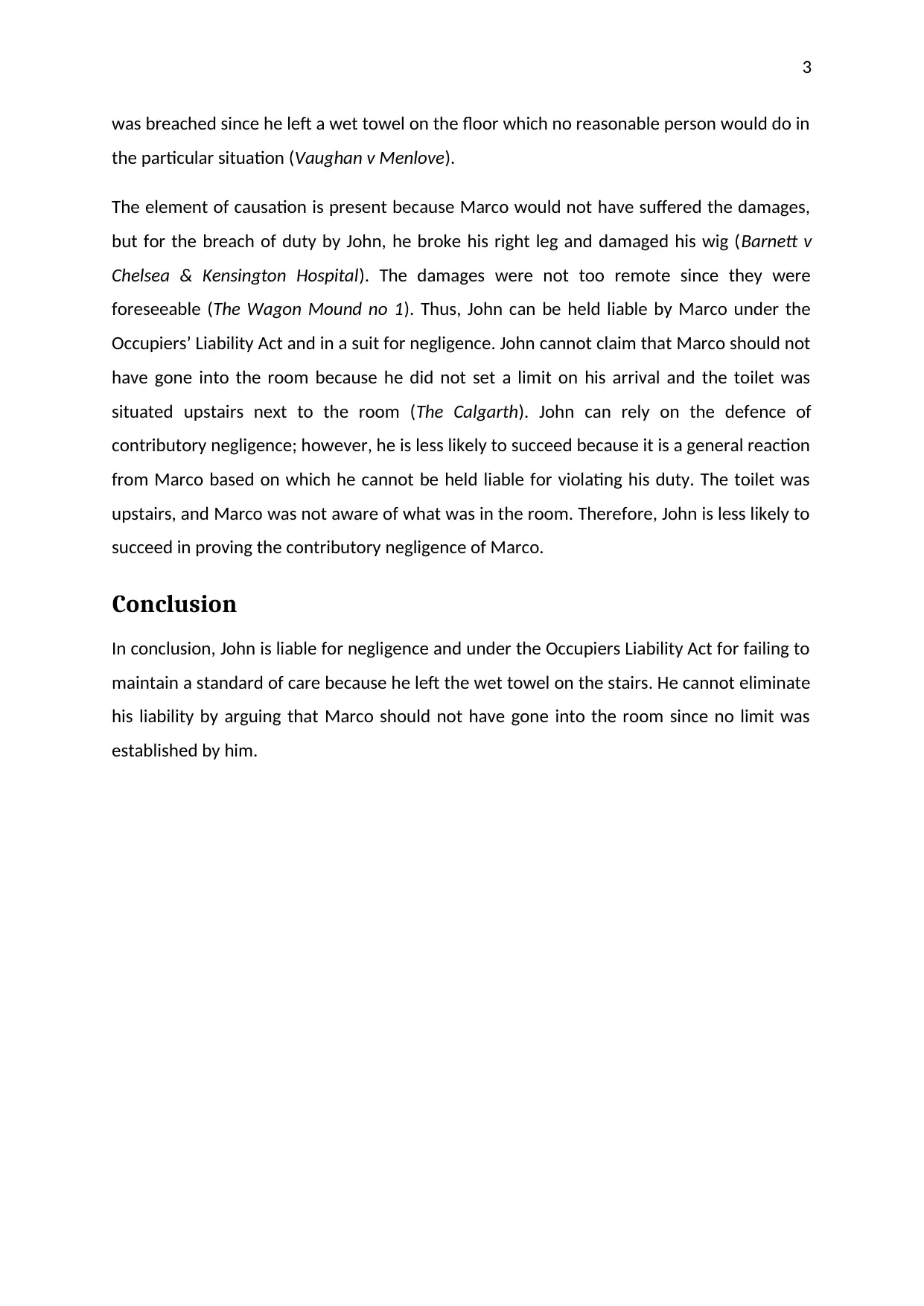
3
was breached since he left a wet towel on the floor which no reasonable person would do in
the particular situation (Vaughan v Menlove).
The element of causation is present because Marco would not have suffered the damages,
but for the breach of duty by John, he broke his right leg and damaged his wig (Barnett v
Chelsea & Kensington Hospital). The damages were not too remote since they were
foreseeable (The Wagon Mound no 1). Thus, John can be held liable by Marco under the
Occupiers’ Liability Act and in a suit for negligence. John cannot claim that Marco should not
have gone into the room because he did not set a limit on his arrival and the toilet was
situated upstairs next to the room (The Calgarth). John can rely on the defence of
contributory negligence; however, he is less likely to succeed because it is a general reaction
from Marco based on which he cannot be held liable for violating his duty. The toilet was
upstairs, and Marco was not aware of what was in the room. Therefore, John is less likely to
succeed in proving the contributory negligence of Marco.
Conclusion
In conclusion, John is liable for negligence and under the Occupiers Liability Act for failing to
maintain a standard of care because he left the wet towel on the stairs. He cannot eliminate
his liability by arguing that Marco should not have gone into the room since no limit was
established by him.
was breached since he left a wet towel on the floor which no reasonable person would do in
the particular situation (Vaughan v Menlove).
The element of causation is present because Marco would not have suffered the damages,
but for the breach of duty by John, he broke his right leg and damaged his wig (Barnett v
Chelsea & Kensington Hospital). The damages were not too remote since they were
foreseeable (The Wagon Mound no 1). Thus, John can be held liable by Marco under the
Occupiers’ Liability Act and in a suit for negligence. John cannot claim that Marco should not
have gone into the room because he did not set a limit on his arrival and the toilet was
situated upstairs next to the room (The Calgarth). John can rely on the defence of
contributory negligence; however, he is less likely to succeed because it is a general reaction
from Marco based on which he cannot be held liable for violating his duty. The toilet was
upstairs, and Marco was not aware of what was in the room. Therefore, John is less likely to
succeed in proving the contributory negligence of Marco.
Conclusion
In conclusion, John is liable for negligence and under the Occupiers Liability Act for failing to
maintain a standard of care because he left the wet towel on the stairs. He cannot eliminate
his liability by arguing that Marco should not have gone into the room since no limit was
established by him.
Paraphrase This Document
Need a fresh take? Get an instant paraphrase of this document with our AI Paraphraser
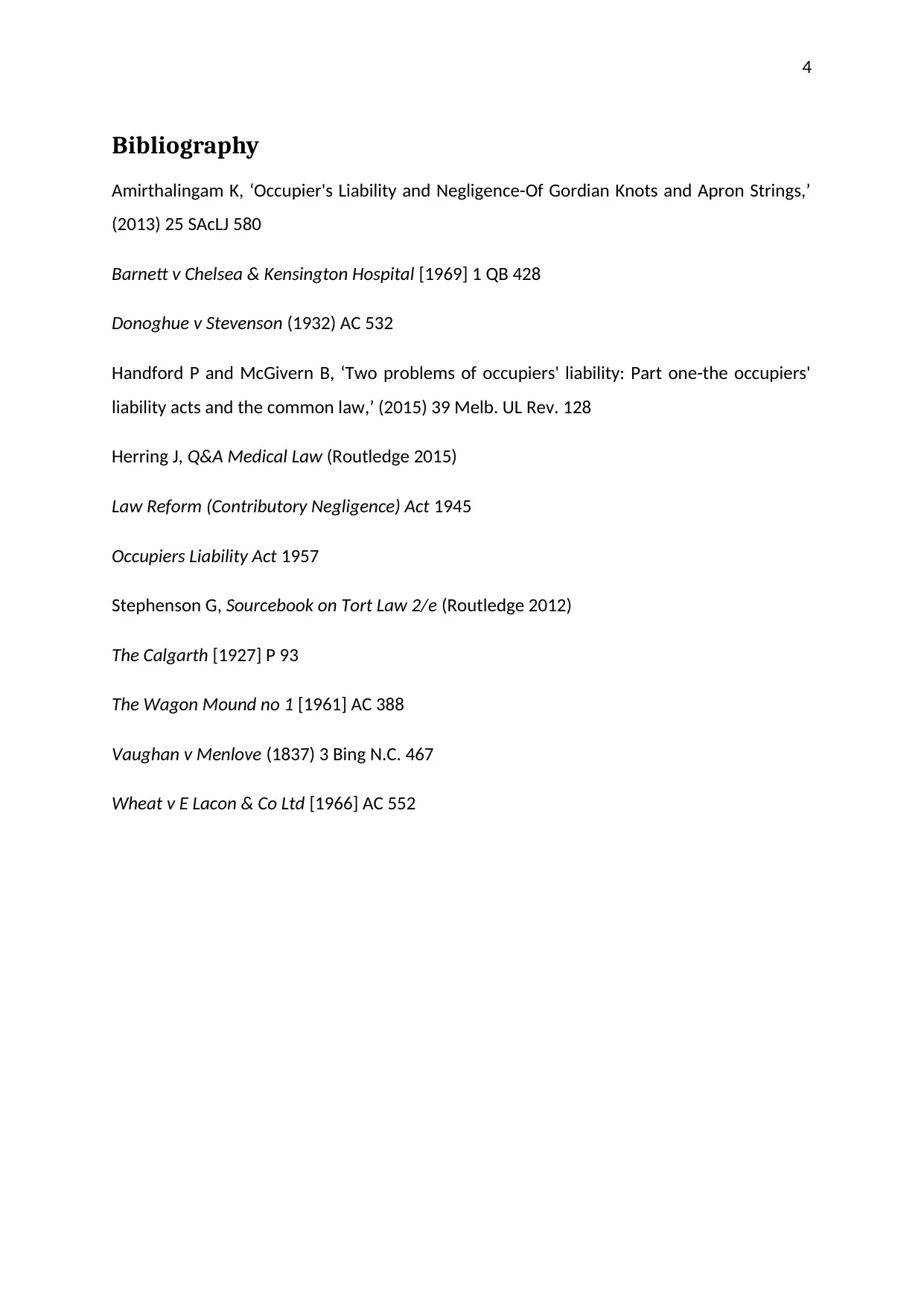
4
Bibliography
Amirthalingam K, ‘Occupier's Liability and Negligence-Of Gordian Knots and Apron Strings,’
(2013) 25 SAcLJ 580
Barnett v Chelsea & Kensington Hospital [1969] 1 QB 428
Donoghue v Stevenson (1932) AC 532
Handford P and McGivern B, ‘Two problems of occupiers' liability: Part one-the occupiers'
liability acts and the common law,’ (2015) 39 Melb. UL Rev. 128
Herring J, Q&A Medical Law (Routledge 2015)
Law Reform (Contributory Negligence) Act 1945
Occupiers Liability Act 1957
Stephenson G, Sourcebook on Tort Law 2/e (Routledge 2012)
The Calgarth [1927] P 93
The Wagon Mound no 1 [1961] AC 388
Vaughan v Menlove (1837) 3 Bing N.C. 467
Wheat v E Lacon & Co Ltd [1966] AC 552
Bibliography
Amirthalingam K, ‘Occupier's Liability and Negligence-Of Gordian Knots and Apron Strings,’
(2013) 25 SAcLJ 580
Barnett v Chelsea & Kensington Hospital [1969] 1 QB 428
Donoghue v Stevenson (1932) AC 532
Handford P and McGivern B, ‘Two problems of occupiers' liability: Part one-the occupiers'
liability acts and the common law,’ (2015) 39 Melb. UL Rev. 128
Herring J, Q&A Medical Law (Routledge 2015)
Law Reform (Contributory Negligence) Act 1945
Occupiers Liability Act 1957
Stephenson G, Sourcebook on Tort Law 2/e (Routledge 2012)
The Calgarth [1927] P 93
The Wagon Mound no 1 [1961] AC 388
Vaughan v Menlove (1837) 3 Bing N.C. 467
Wheat v E Lacon & Co Ltd [1966] AC 552
1 out of 5
Related Documents
Your All-in-One AI-Powered Toolkit for Academic Success.
+13062052269
info@desklib.com
Available 24*7 on WhatsApp / Email
![[object Object]](/_next/static/media/star-bottom.7253800d.svg)
Unlock your academic potential
Copyright © 2020–2026 A2Z Services. All Rights Reserved. Developed and managed by ZUCOL.





